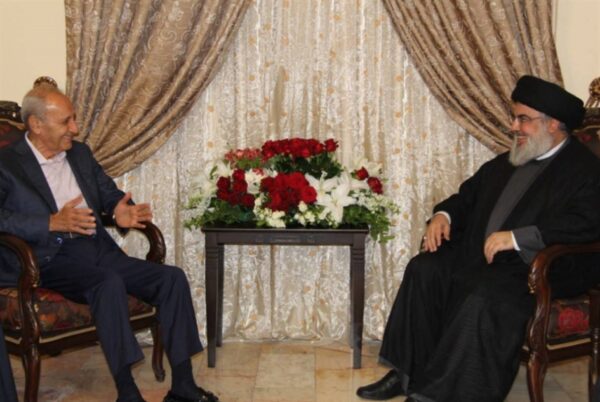The letters come amid Lebanon’s continued political paralysis, economic crisis and rising tensions with Israel. Some members of Congress are calling for sanctions on parliament speaker Nabih Berri, an ally of Hezbollah.
By Adam Lucente
WASHINGTON — Several members of Congress wrote to the Biden administration on Thursday calling for stronger US policy toward Lebanon, with one arguing that Iranian influence is increasing in the crisis-stricken country.
“We must take a more assertive role in shaping Lebanon’s trajectory or risk losing Lebanon entirely as an Iranian client state,” wrote Sen. Jim Risch (R-ID) in a letter to US President Joe Biden seen by Al-Monitor.
Risch’s letter was sent ahead of the third anniversary of the horrific Beirut port explosion on Friday. Reps. Darrell Issa (R-CA), Darin LaHood (R-IL) and Max Miller (R-OH) also penned a letter to US Secretary of State Antony Blinken on Thursday expressing their concerns with the administration’s Lebanon policy.
Risch, who is the top Republican on the Senate Foreign Relations Committee, characterized current US policy towards Lebanon as “life support,” saying it has “failed to deliver results” as the Lebanese government has yet to implement reforms. Risch called on the administration to both support viable Lebanese politicians and counter Iran’s allies in the country more strongly.
The senator specifically criticized Lebanon’s failure to elect a president, and accused Hezbollah of stockpiling weapons. He described speaker of the house Nabih Berri “a clear extension of Hezbollah” and accused the politician of delaying the selection of a new president. To this end, Risch said he welcomes recent European calls for sanctions on Berri and other Lebanese politicians.
Risch added that there has been “no accountability” for the Beirut port explosion, nor the December 2022 killing of an Irish United Nations peacekeeper in southern Lebanon, among other things.
Ed Gabriel, the president of the American Task Force on Lebanon and a former US ambassador, applauded Risch’s letter. “Lebanon’s political leaders have continued to put their own interests ahead of Lebanon’s,” Gabriel told Al-Monitor. “The US must consider all available measures against those who are blocking progress to serve the Lebanese people,” he argued.
Sanctions on Berri?
On the House side, Issa, LaHood and Miller also lamented Lebanon’s failure to elect a president and called for “targeted sanctions, including freezing any dollar-denominated assets, on those who have demonstrated a pattern of obstructing the presidential election process, including Lebanese Speaker Nabih Berri, among others.”
Lebanon has been mired in a political and economic crisis since late 2019. The situation was exacerbated when more than 2,000 tons of fertilizer exploded in the Beirut port in August 2020, leading to more than 200 deaths, thousands of injuries, and significant damage to the city. To date, nobody has been convicted in relation to the tragedy.
The US, as well as France and the International Monetary Fund, have been reluctant to provide further aid to Lebanon in the absence of governance and anti-corruption reforms. A $3 billion bailout from the IMF last year has yet to be delivered due the lack of reform.
On the political front, Lebanon’s parliament has failed 12 times to elect a president since President Michel Aoun’s term ended last October. Berri is a member of the Amal Movement, and supports Hezbollah’s endorsed candidate, Suleiman Frangieh. Per Risch’s letter, the European Parliament passed a resolution last month calling for sanctions on officials responsible for obstructing the election of a new president, and named Berri specifically.
Meanwhile, tensions between Hezbollah and Israel on the border are rising. Israel shelled Lebanon in response to rocket fire last month, among several other incidents. Israeli President Isaac Herzog visited the Lebanese border on Wednesday, and warned Hezbollah not to provoke Israel.
Not so fast
Hanin Ghaddar, a fellow at the Washington Institute for Near East Policy, said that US sanctions typically target Hezbollah and lesser-known individuals. Calls to penalize Berri himself are new, she said.
“Going after the smaller fish is a way of threatening Berri to comply. It seems today things are really getting out of hand and Berri is not cooperating,” Ghaddar told Al-Monitor.
Ghaddar still did not expect neither the US nor the EU to actually sanction Berri. “I still think it’s a threat rather than a serious attempt,” she said, “but this is a message to Berri saying that ‘if you continue to follow Hezbollah’s agenda, you will be sanctioned.’”
The White House referred comment to the State Department, who did not immediately respond to Al-Monitor’s request for comment.
Al-Monitor


Leave a Reply
You must be logged in to post a comment.